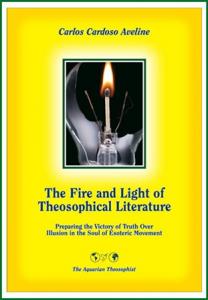
Positive Feelings and Actions Emerge
From a Wider Notion of Space and Time
Carlos Cardoso Aveline

The theosophical movement is a pedagogical effort. In it, researching, learning and teaching are three inseparable phases of one single process extending over millennia.
A direct experience of the theosophical effort in the last few decades and the study of its historical evolution since 1875 can demonstrate that the theosophical effort must include that Optimism and that Confidence which inevitably accompany pioneer actions.
Less than 200 years old, the movement is yet too young to show all its fruits. Being a forerunner, its effort requires a lasting determination from those who understand and share its purpose.
A Broader and More Confident Look at Life
Confidence in life emerges from contact with that which is true, good and enduring. Lack of confidence as such is limited to the unenlightened and fleeting portions of one’s lower self.
One must be severe with mistakes, for otherwise there is no learning. At the same time, one must be kind to the persons who make mistakes, and that includes ourselves.
The viewpoint from which to look at life must be that of the knowledge of everyone’s sacred potentialities, and of their natural process of germination, which we must strive to help and stimulate, not to hinder. It is always useful to observe our inner thoughts and feelings while we look at the progress made by our brothers and sisters along the way. Are we happy to see them learning well? Envy would be a symptom that one’s Antahkarana is momentarily asleep, or even on some sort of vacation.
The theosophical movement must constantly build itself as an environment which leads to the better development of individual Antahkaranas. For this, in the next decades, the theosophical movement and mankind in general should obtain a clearer notion of their own divine potentialities and destiny.
“The Secret Doctrine” and other theosophical classics are not ambiguous about that. Confidence in oneself, in life and in the future is taught everywhere in esoteric philosophy.
A generous view of life must fight falsehood, insincerity and ethical decay; and from its victory each new civilization must emerge. Our central task includes the need to develop efficient actions to evoke the next planetary civilization; to help it emanate from “above”; to stimulate the three hypostases leading to its objective appearance.
For such action to take place, a few millennia must be considered short-term.
The purpose of studying “The Secret Doctrine” or “The Mahatma Letters” includes an understanding of the fact that the goal of earnest students is not to be attained early next week. Twenty thousand years, which may mean but a few incarnations, should not be seen as a long time.
The optimism that looks at life from a wider perspective has a closer relation with one’s spiritual soul and is in harmony with it.
The study of esoteric philosophy expands one’s existential and psychological sense of space and time. Those portions of our lower self which are in line with our spiritual soul look at a period of a few millennia with a deep sense of joy, happiness, and freedom.
000
The above text was first published in the May 2012 edition of “The Aquarian Theosophist”.
On the role of the theosophical movement in the ethical awakening of mankind, read the book “The Fire and Light of Theosophical Literature”, by Carlos Cardoso Aveline.

Published in 2013 by The Aquarian Theosophist, the volume has 255 pages and can be obtained through Amazon Books.
000